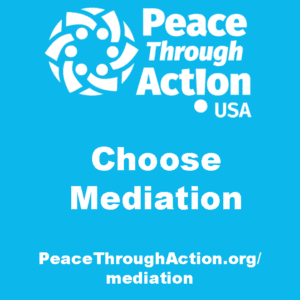 What is mediation?
What is mediation?
Mediation is a formalized process of negotiation whereby disputing people or groups seek the intervention of a third party who has no authority to make final decisions for them but helps them in a variety of areas. Mediators help disputants by identifying problems and discussing desired outcomes, facilitating discussions, and/or proposing, evaluating, and comparing alternative solutions.
In general, the mediation process follows as such: two parties (such as relationship partners, neighbors, work colleagues) face a dispute with no clear resolution. After further discussion and heightened emotions, the disputants decide that finding a mediator might make their discussions more productive and solution oriented. The disputants seek out intervention from an individual that is acceptable to each to help inform and uncover alternative solutions. Importantly, the mediator does not have influence over either party nor do they assert additional opinions. They create the space to make negotiation successful.[1]
Mediation has existed as a form of negotiation for millennia. The use of mediation in legal practice and conflict resolution in the United States emerged in the late 19th and early 20th centuries in response to labor-management disputes, leading to the creation of the U.S. Department of Labor and the institutionalization of mediation processes. Additionally, mediation emerged as a method used within the civil rights movement. Also, it is a part of legal education and used in the justice system.[2]
Mediators in the U.S. often operate under a governmental, legal, or educational institution whereby they have authority to enforce mediated agreements. In these cases, mediation can result in arbitration, judicial enforcement, or legislative enforcement.
Mediators can also be a third party acceptable to the disputants with no authority to make binding decisions. Non-governmental and extralegal mediation includes cases of civil dispute or workplace disagreement.
[1] Chapter six of Christopher Moore’s book, The Mediation Process, illustrates the mediation process and the elements that lead to successful mediation.
[2] Moore, Christopher W. (2014). The mediation process: practical strategies for resolving conflict (4th ed.). Jossey-Bass.
How do people learn mediation?
Individuals can learn to be a mediator through a variety of sources. They can train with an organization such as The National Association for Community Mediation, the Association for Conflict Resolution, or a statewide or local mediation organization. They can receive certification from a university. Mediators can pursue a position with and receive training from a governmental, legal, or educational institution.[1]
[1] National Association for Community Mediation. https://www.nafcm.org/.
How do people implement mediation?
Individuals trained in mediation can offer their services to others in their community. They could do so independently but are more likely to do so through nonprofit mediation centers, law firms, or government agencies. They can provide mediation services free or for a fee. Disputants in civil and criminal legal matters may be required by courts to engage in mediation or offered mediation as the method for settling infractions or crimes.
For what types of circumstances is mediation suited?
Mediation is well suited for interrupting aggression and violence between people and groups.
Does mediation work for preventing or controlling aggression or violence?
Mediation is becoming an increasingly valuable strategy for negotiation between disputants that can avoid arbitration or civil or criminal penalties. Research published in Conflict Resolution Quarterly highlights mediation as a tool for divorce settlement, elder abuse, and resolving neighborhood disputes.[1] Rural and indigenous communities from around the globe use mediation with regularity to solve communal disputes.[2] Finally, it is worth noting that the United Nations Mediation Support Unit operates with the express intention of supporting mediation in international relations.[3]
[1] Conflict Resolution Quarterly. Spring 2021, Vol. 38 Issue 3. P. 157-174; 175-187; 189-208.
[2] Christopher Moore outlines these international mediation strategies in chapter 3 of The Mediation Process.
[3] United Nations. Mediation Support Unit. https://peacemaker.un.org/mediation-support
Where else might I go to learn more about mediation?
- National Association for Community Mediation—NAFCM supports peacemakers by being the hub for advancing the work of community mediation, aggregating the wisdom of community mediation, and amplifying the voice of community mediators.
- The JAMS Foundation—JAMS is the world’s largest private alternative dispute resolution (ADR) provider.
- The United Nations—At the international level, mediation is often performed by the offices of the United Nations.
- Harvard University Program on Negotiation—Harvard University has had a program on negotiation since 1983 and works in consortium with other universities. However, many universities and local educational institutions have negotiation and meditation programs.
Information Sheet-Choose-Mediation (PDF)
Page Author: Grant Anderla (volunteer)
Have a suggested improvement to this information sheet? Send it to inbox@peacethroughaction.org
Do Something Right Away to Increase Peace
Subscribe to our YouTube channel
Give a gift of money to support our mission delivery activities
Choose opportunities to take part in our #PeaceBeginsWithWe campaign
